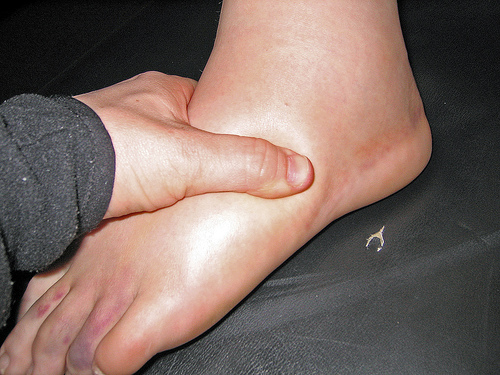Swollen hands and feet, also called edema, is caused by buildup of fluid in the body. Dependent extremities such as hands, ankles and feet are prone to swelling, though other parts of the body can also get edema like the abdomen. Reducing the amount of salt intake as well as taking medication can reduce swelling. If the swelling is a result of a disease, you will need to treat the disease separately.

Possible Causes of Swollen Hands and Feet
1. Pregnancy Complications
It is common for women to have swollen feet during pregnancy. Excessive or sudden swelling might be as a result of preeclampsia. This is a condition whereby protein and blood pressure in the uterine develop after 20 weeks into the pregnancy. If you get serious swellings or other symptoms like vomiting, nausea, abdominal pain and frequent urination, consult a doctor as soon as possible.
2. Injury
An injury sustained in the leg or ankle can lead to swollen feet. This happens when the ligaments that hold the foot and the ankle are stretched out of their normal range. To reduce the swelling, use an ice compress on the swollen area, elevate and rest your leg.
3. Lymphedema
Lymph is a protein fluid that moves around the body through the lymphatic system. Its filtration occurs in the lymph nodes where unwanted materials are destroyed. This condition is caused by the collection of lymphatic fluid in tissues and can result in swollen hands and feet. It occurs as a result of after radiation therapy in cancer patients or after the removal of the lymph nodes.
4. Venous Insufficiency
Swollen feet can be an indication of venous insufficiency. This means that blood is not moving up the legs and feet as required. There are valves that are supposed to maintain the upward flow of blood, but if they are damaged, this condition occurs. Symptoms of chronic venous insufficiency involve ulcers and change in skin color.
5. Infection
Infections can lead to swollen hands and feet. If you have any nerve problems involving the feet or diabetic neuropathy, there is a higher risk of getting foot infection. If you are diabetic, it is vital to check if you have any sores or blisters.
6. Blood Clot
Blood clots can form in the veins leading to swelling in hands and feet. Blood flow is disrupted by the clots, which results in the swelling. The clots can either be deep or superficial. Blood clots can be fatal if they occur in vital parts of the body. If you notice one of your feet swelling without pain, consult a doctor.
7. Heart, Liver or Kidney Disease
In some cases, swollen hands and feet could be an indication of a kidney, liver or heart disease. Heart failure could result in swollen feet in the evening because of water and salt retention. Fluids build up in the body when the kidneys are not functioning properly. A problem in the liver could lead to blood leaking resulting in swollen abdomen, ankles, hands and feet.
8. Medical Side Effects
Some drugs cause the feet to swell. They include:
- Hormones like estrogen
- Calcium channel blockers
- Steroids
- Antidepressants
- Diabetes medication
- Non-steroidal anti-inflammatory drugs
If you are suspecting your drugs are making you have swollen feet, consult your doctor.
9. Insect Bites or Stings
Normally, swelling or redness follows after an insect bite or sting. However, some people are allergic to the bites or stings leading to severe swelling.
10. Arthritis
Arthritis affects joints and can result in swollen hands and feet. The swelling is caused by increase in the synovial fluid in the joints or the joint lining.
When to See a Doctor
You should make an appointment with your doctor if you notice a swelling, shiny or stretched skin. Medical attention should be sought immediately if you experience:
- Chest pain
- Problems breathing
- Shortness of breath
The above could be symptoms of pulmonary edema which needs immediate treatment.
If you are pregnant, call your obstetrician if you notice you have abnormal swelling in hands and feet, or your face is swollen and you have puffy eyes. This could be an indication of preeclampsia, a severe condition.
How to Relieve Swollen Hands and Feet
1. Cutting Back on Salt
Apart from prescribing a diuretic, the doctor can recommend you cut down on salt intake. You should also avoid foods like potato chips, bacon, bouillon, ham, soy sauce, canned soups and table salt.
2. Leg Elevation
When sitting for long periods, put your legs up and rest them on an ottoman or an extra chair. When lying on the bed or sofa, you can raise your legs higher by placing pillows under your feet.
3. Walking Breaks
If you are not in a position to elevate your feet, like at work, you can try and take walking breaks. Walk for 5 minutes every hour to increase blood flow in your legs.
4. Compression Stockings
If you are required to stand for a long time, you can wear compression stocking or knee-highs or a support hose. This will improve the flow of blood from your feet to your heart.
5. Protection
The swollen area should be kept moisturized, clean and protected from injury, cuts and scrapes. If the swelling is on your feet, always wear protection.
